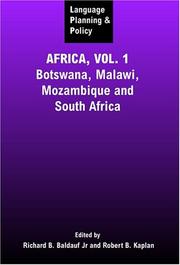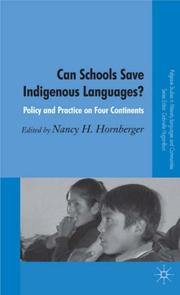| Listing 1 - 9 of 9 |
Sort by
|
Book
ISBN: 0230251722 1137316233 Year: 2016 Publisher: London : Palgrave Macmillan UK : Imprint: Palgrave Macmillan,
Abstract | Keywords | Export | Availability | Bookmark
 Loading...
Loading...Choose an application
- Reference Manager
- EndNote
- RefWorks (Direct export to RefWorks)
‘This volume is an ambitious undertaking, fruit of meticulous research and deep reflection. Professor Kamwangamalu’s panoramic assessment of language planning, economics and game theory in colonial, post-colonial and globalised sub-Saharan African settings brilliantly deploys notions of ‘prestige planning’ to recurring dilemmas about the choices of medium of instruction in schooling and language choices in public and private institutions. This volume is groundbreaking theoretically and methodologically, but remains grounded in the real world needs of diverse African communities in their unique historical experiences of colonialism and their modern trajectories in an increasingly interlinked world. Professor Kamwangamalu’s reinvigoration of the framework of ‘prestige’ in language and how it can be activated adds great practical value to his impressive scholarly achievement.’ —Joseph Lo Bianco, Professor, The University of Melbourne, Australia This book addresses the perennial question of how to promote Africa’s indigenous languages as medium of instruction in educational systems. Breaking with the traditional approach to the continent’s language question by focusing on the often overlooked issue of the link between African languages and economic development, Language Policy and Economics considers African languages an integral part of a nation’s socio-political and economic development. Therefore, the book argues that any language policy designed to promote these languages in such higher domains as the educational system in particular must have economic advantages if the intent is to succeed, and proposes Prestige Planning as the way to address this issue. The proposition is a welcome break away from language policies which pay lip-service to the empowerment of African languages while, by default, strengthening the stranglehold of imported European languages. Nkonko M. Kamwangamalu is Professor of Linguistics at Howard University, Washington, DC. He is co-Editor of Current Issues in Language Planning, author of The Language Situation in South Africa (2004), of articles in Chicago Linguistic Society, Georgetown Round Table on Languages and Linguistics, Multilingua, Applied Linguistics, Journal of Asian Pacific Communication, World Englishes, Language Problems and Language Planning, Journal of Multilingual and Multicultural Development, Journal of Creative Communications, Studies in the Linguistic Sciences, TESOL Quarterly, Annual Review of Applied Linguistics, International Journal of the Sociology of Language, to name a few, and of chapters in edited collections.
Linguistics. --- African languages. --- Multilingualism. --- Language policy. --- Game theory. --- Economic policy. --- Language Policy and Planning. --- African Languages. --- Economic Policy. --- Game Theory. --- Language policy --- Glottopolitics --- Institutional linguistics --- Language and languages --- Language and state --- Languages, National --- Languages, Official --- National languages --- Official languages --- State and language --- Government policy --- Communication policy --- Language planning --- Games, Theory of --- Theory of games --- Mathematical models --- Mathematics --- Economic nationalism --- Economic planning --- National planning --- State planning --- Economics --- Planning --- National security --- Social policy --- Plurilingualism --- Polyglottism
Digital
ISBN: 9781137316233 Year: 2016 Publisher: London Palgrave Macmillan UK :Imprint: Palgrave Macmillan
Abstract | Keywords | Export | Availability | Bookmark
 Loading...
Loading...Choose an application
- Reference Manager
- EndNote
- RefWorks (Direct export to RefWorks)
‘This volume is an ambitious undertaking, fruit of meticulous research and deep reflection. Professor Kamwangamalu’s panoramic assessment of language planning, economics and game theory in colonial, post-colonial and globalised sub-Saharan African settings brilliantly deploys notions of ‘prestige planning’ to recurring dilemmas about the choices of medium of instruction in schooling and language choices in public and private institutions. This volume is groundbreaking theoretically and methodologically, but remains grounded in the real world needs of diverse African communities in their unique historical experiences of colonialism and their modern trajectories in an increasingly interlinked world. Professor Kamwangamalu’s reinvigoration of the framework of ‘prestige’ in language and how it can be activated adds great practical value to his impressive scholarly achievement.’ —Joseph Lo Bianco, Professor, The University of Melbourne, Australia This book addresses the perennial question of how to promote Africa’s indigenous languages as medium of instruction in educational systems. Breaking with the traditional approach to the continent’s language question by focusing on the often overlooked issue of the link between African languages and economic development, Language Policy and Economics considers African languages an integral part of a nation’s socio-political and economic development. Therefore, the book argues that any language policy designed to promote these languages in such higher domains as the educational system in particular must have economic advantages if the intent is to succeed, and proposes Prestige Planning as the way to address this issue. The proposition is a welcome break away from language policies which pay lip-service to the empowerment of African languages while, by default, strengthening the stranglehold of imported European languages. Nkonko M. Kamwangamalu is Professor of Linguistics at Howard University, Washington, DC. He is co-Editor of Current Issues in Language Planning, author of The Language Situation in South Africa (2004), of articles in Chicago Linguistic Society, Georgetown Round Table on Languages and Linguistics, Multilingua, Applied Linguistics, Journal of Asian Pacific Communication, World Englishes, Language Problems and Language Planning, Journal of Multilingual and Multicultural Development, Journal of Creative Communications, Studies in the Linguistic Sciences, TESOL Quarterly, Annual Review of Applied Linguistics, International Journal of the Sociology of Language, to name a few, and of chapters in edited collections.
Economic policy and planning (general) --- Recreation. Games. Sports. Corp. expression --- Linguistics --- African languages --- Afrikaans --- co-creation --- economische politiek --- spellen --- linguïstiek --- meertaligheid --- Africa
Book
Year: 2000 Publisher: Berlin Mouton de Gruyter
Abstract | Keywords | Export | Availability | Bookmark
 Loading...
Loading...Choose an application
- Reference Manager
- EndNote
- RefWorks (Direct export to RefWorks)
Book
Year: 2002 Publisher: Oxford Blackwell
Abstract | Keywords | Export | Availability | Bookmark
 Loading...
Loading...Choose an application
- Reference Manager
- EndNote
- RefWorks (Direct export to RefWorks)


ISBN: 1280739355 9786610739356 1853597260 9781853597268 1853597252 Year: 2004 Publisher: Bristol Blue Ridge Summit
Abstract | Keywords | Export | Availability | Bookmark
 Loading...
Loading...Choose an application
- Reference Manager
- EndNote
- RefWorks (Direct export to RefWorks)
This volume covers the language situation in Botswana, Malawi, Mozambique and South Africa explaining the linguistic diversity, the historical and political contexts and the current language situation, including language-in-education planning, the role of the media, the role of religion, and the roles of non-indigenous languages. The authors are indigenous and have been participants in the language planning context.
Language planning --- Language and languages --- Planned language change --- Sociolinguistics --- Planning --- Botswana. --- Malawi. --- Mozambique. --- South Africa. --- language planning. --- language policy. --- linguistic diversity.


ISBN: 0230013325 0230582494 1281975907 1349284661 9786611975906 Year: 2008 Publisher: Palgrave Macmillan UK
Abstract | Keywords | Export | Availability | Bookmark
 Loading...
Loading...Choose an application
- Reference Manager
- EndNote
- RefWorks (Direct export to RefWorks)
Book

ISBN: 1788923081 1788923073 9781788923071 9781788923088 9781788923064 1788923065 9781788923057 1788923057 Year: 2019 Publisher: Bristol Blue Ridge Summit
Abstract | Keywords | Export | Availability | Bookmark
 Loading...
Loading...Choose an application
- Reference Manager
- EndNote
- RefWorks (Direct export to RefWorks)
Spanning Indigenous settings in Africa, the Americas, Aotearoa/New Zealand, Australia, Central Asia and the Nordic countries, this book examines the multifaceted language reclamation work underway by Indigenous peoples throughout the world. Exploring political, historical, ideological, and pedagogical issues, the book foregrounds the decolonizing aims of contemporary Indigenous language movements inside and outside of schools. Many authors explore language reclamation in their own communities. Together, the authors call for expanded discourses on language planning and policy that embrace Indigenous ways of knowing and forefront grassroots language reclamation efforts as a force for Indigenous sovereignty, social justice, and self-determination. This volume will be of interest to scholars, educators and students in applied linguistics, Ethnic/Indigenous Studies, education, second language acquisition, and comparative-international education, and to a broader audience of language educators, revitalizers and policymakers.
Language revival. --- Linguistic minorities. --- Language maintenance. --- Language policy. --- Glottopolitics --- Institutional linguistics --- Language and languages --- Language and state --- Languages, National --- Languages, Official --- National languages --- Official languages --- State and language --- Communication policy --- Language planning --- Language loyalty --- Maintenance of language --- Sociolinguistics --- Minority languages --- Minorities --- Language renewal --- Language revitalization --- Renewal, Language --- Restoration of languages --- Revitalization, Language --- Revival of languages --- Government policy --- Maintenance --- Political aspects --- Restoration --- Revival --- Indigenous languages. --- language endangerment. --- language planning and policy. --- language reclamation. --- language revitalization. --- Minoritized languages
Book

ISBN: 9781501512353 Year: 2021 Publisher: Berlin Boston
Abstract | Keywords | Export | Availability | Bookmark
 Loading...
Loading...Choose an application
- Reference Manager
- EndNote
- RefWorks (Direct export to RefWorks)
Book

ISBN: 9781847692849 Year: 2010 Publisher: Bristol Blue Ridge Summit
Abstract | Keywords | Export | Availability | Bookmark
 Loading...
Loading...Choose an application
- Reference Manager
- EndNote
- RefWorks (Direct export to RefWorks)
| Listing 1 - 9 of 9 |
Sort by
|

 Search
Search Feedback
Feedback About UniCat
About UniCat  Help
Help News
News